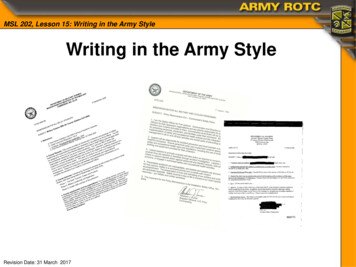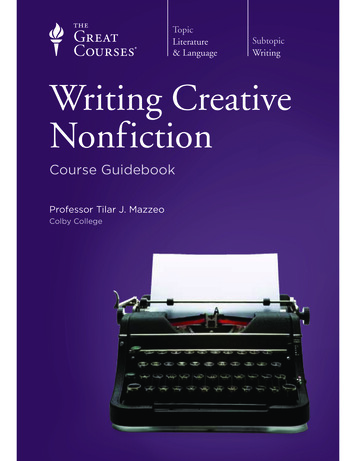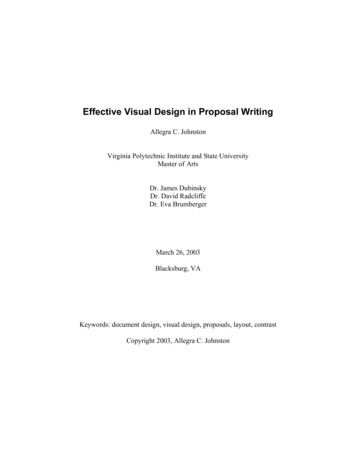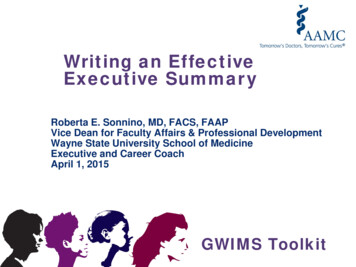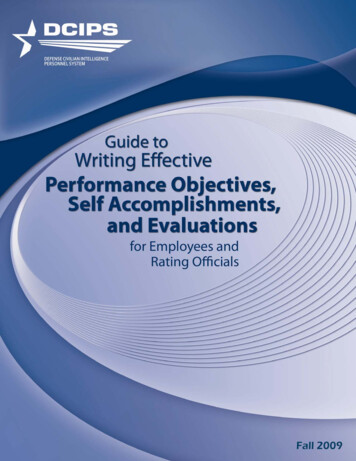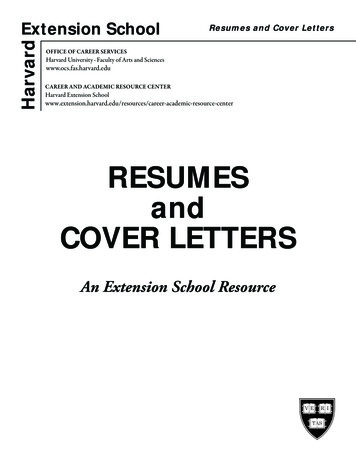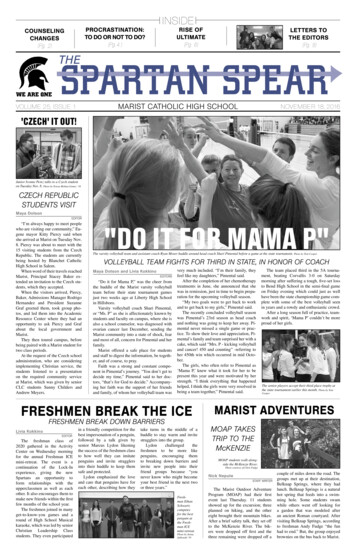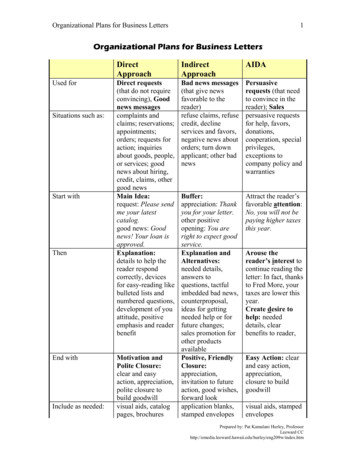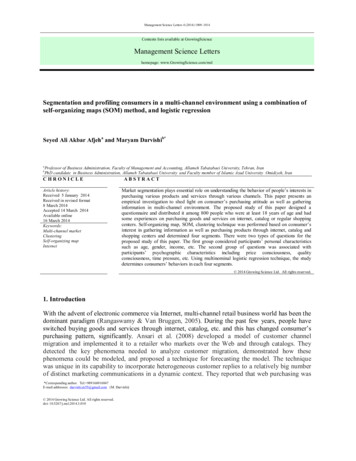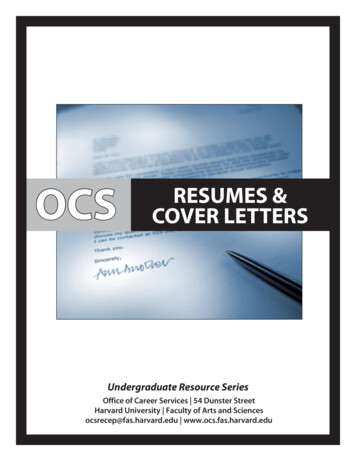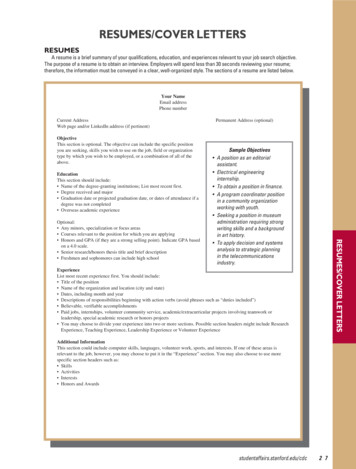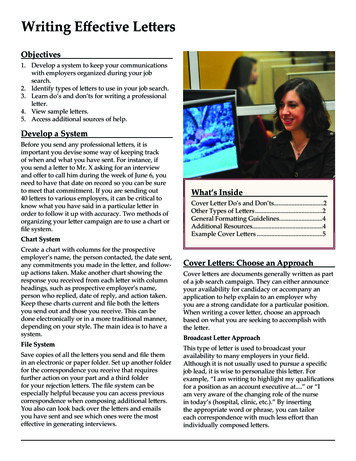
Transcription
Writing Effective LettersObjectives1. Develop a system to keep your communicationswith employers organized during your jobsearch.2. Identify types of letters to use in your job search.3. Learn do’s and don’ts for writing a professionalletter.4. View sample letters.5. Access additional sources of help.Develop a SystemBefore you send any professional letters, it isimportant you devise some way of keeping trackof when and what you have sent. For instance, ifyou send a letter to Mr. X asking for an interviewand offer to call him during the week of June 6, youneed to have that date on record so you can be sureto meet that commitment. If you are sending out40 letters to various employers, it can be critical toknow what you have said in a particular letter inorder to follow it up with accuracy. Two methods oforganizing your letter campaign are to use a chart orfile system.Chart SystemCreate a chart with columns for the prospectiveemployer’s name, the person contacted, the date sent,any commitments you made in the letter, and followup actions taken. Make another chart showing theresponse you received from each letter with columnheadings, such as prospective employer’s name,person who replied, date of reply, and action taken.Keep these charts current and file both the lettersyou send out and those you receive. This can bedone electronically or in a more traditional manner,depending on your style. The main idea is to have asystem.File SystemSave copies of all the letters you send and file themin an electronic or paper folder. Set up another folderfor the correspondence you receive that requiresfurther action on your part and a third folderfor your rejection letters. The file system can beespecially helpful because you can access previouscorrespondence when composing additional letters.You also can look back over the letters and emailsyou have sent and see which ones were the mosteffective in generating interviews.What’s InsideCover Letter Do’s and Don’ts.2Other Types of Letters.2General Formatting Guidelines.4Additional Resources.4Example Cover Letters.5Cover Letters: Choose an ApproachCover letters are documents generally written as partof a job search campaign. They can either announceyour availability for candidacy or accompany anapplication to help explain to an employer whyyou are a strong candidate for a particular position.When writing a cover letter, choose an approachbased on what you are seeking to accomplish withthe letter.Broadcast Letter ApproachThis type of letter is used to broadcast youravailability to many employers in your field.Although it is not usually used to pursue a specificjob lead, it is wise to personalize this letter. Forexample, “I am writing to highlight my qualificationsfor a position as an account executive at.” or “Iam very aware of the changing role of the nursein today’s (hospital, clinic, etc.).” By insertingthe appropriate word or phrase, you can tailoreach correspondence with much less effort thanindividually composed letters.
Targeted ApproachThis approach is used to investigate a specific joblead. You may be answering an ad or investigatinga suggestion offered from The Career Center, arelative, friend, faculty member, etc. You mayalso mention specific information you discoveredthrough conversations or by doing research about theorganization.Tailor your letter to the job description specifiedin the ad. Some reading between the lines may benecessary so you can customize your response. Besure to:yy Apply for the job posting as soon as possibleafter it appears. However, make sure you allowyourself enough time to adequately prepare.yy Be creative and authentic. Interpret theemployer’s needs and be sure to articulate howyour qualifications and experiences meet theseneeds. Make sure your letter stands out from thewave of response letters the employer is sure toreceive.yy Follow the instructions carefully regarding wherethe response should be directed and what toinclude (e.g., résumé, statement of geographicpreference, etc.).yy Answer all questions, if provided, with theexception of responding to a request for salaryrequirements. In this case, it is advisable to avoidthe question and simply indicate that salary isnegotiable.yy Be brief! Letters should be individualized,concise, and factual.yy Always consider the reaction of employers byputting yourself in their place. Try to determinewhat accomplishments and skills would be mostattractive to a particular employer.yy Be straightforward, professional, and businesslike— remember you are marketing yourself. As withthe résumé, stick to the facts.Cover Letter Do’s and Don’tsDoyy Spell, punctuate, and format correctly inprint and email communication.yy Write in your own words and useconversational language.yy Whenever possible, address to anindividual, with his/her correct title.yy Slant letter toward what you can offeremployers, not what they should beoffering you.yy Be brief, concise, and to the point.yy Take advantage of any link to theemployer that can give you an edge overthe competition (mentioning the name ofsomeone you know in the organization ora mutual contact).yy If including an attachment with an email toan employer, make sure the document canbe easily opened (a PDF, for example).yy Hand-sign in addition to typing yoursignature (unless the letter is sentelectronically).yy Use quality paper.yy Close by expressing a wish to speakfurther about the position and how youmight contribute to the organization.yy Include your contact information.Don’tyy Use overly formal language or use wordsincorrectly.yy Use gimmicks in an attempt to be originalor clever.yy Lead with constant use of “I.”yy Be arrogant or indicate the employerwould be lucky to hire you.View the “Example Cover Letters” on page 5 of this guideto get an idea of how to format and design content for acover letter.Other Types of LettersInquiry LetterFirst, prepare a list of organizations whichcomplement the position you are seeking, as wellas your interest and training. Then, write a letter ofinquiry to contact employers requesting employmentinformation. It is important to research the2organization as much as possible to give credibilityand insight to your contact letter.In your inquiry letter:yy Write to a specific person within theorganization. As a general rule, send the letterto the Employment, Recruitment, or PersonnelManager in the Personnel or Human ResourcesDepartment. Directing your letter to the keyWriting Effective Letters
executive or manager in the department to whichyou are applying is also advisable. If the contactperson’s name is not available, address yourletter: “To whom it may concern” or “Dear HiringManager.”yy State your exact interest in the organization andexplain why they should be interested in you.The more you know about employers, the easierit will be to tailor your letter to their needs andinterests.yy Emphasize your positive assets and skills. Be asspecific as possible about the type of positionyou are seeking and tie this to your knowledgeof the organization and its products, services, orbusiness.yy State when you would be available to meet foran interview and include a phone number and/oremail where you can most easily be reached. Youcan also write that you will follow up via phoneor email within a certain time frame.Interview Appreciation LetterFollowing the interview, send a thank you letter oremail expressing appreciation for the interviewer’stime. Not only is this an accepted courtesy, but yourletter can also refresh your session in the mind of theinterviewer. In your letter:yy Express appreciation for the interviewer’sconsideration and arrangement of the meeting.yy State the date of the interview and name of theemployer.yy Reiterate your interest in the employer bymentioning new points or assets you may haveforgotten to address in the original interview.yy Ask any questions you may have which were notanswered in the original interview.yy Express your anticipation to receive wordregarding a decision.Letter of AcknowledgmentOnce you have received an offer from anorganization, it is important to respond as soon aspossible. While an immediate “yes” or “no” is notessential, acknowledgment of the offer is expected.In your acknowledgment letter:yy Acknowledge receipt of the offer.yy Express your appreciation for the offer.yy Notify the employer of the date by which youexpect to make your decision.Writing Effective LettersLetter of AcceptanceOnce you have decided to accept the offer, theemployer should be notified immediately. It is notnecessary to wait until the offer expiration datebefore contacting the person making the offer.Employers will appreciate your promptness, as itwill allow them to assess the status of their personnelselection process. In your acceptance letter:yy Acknowledge your receipt of the offer by letter,face-to-face meeting, or telephone call on the dateit occurred.yy Be as specific as possible, mentioning startingsalary and supervisor’s name. Be sure to list anddetail all items (benefits, moving expenses, etc.)agreed to in the offer.yy State when you will be able to report to work.Acknowledge if employment is contingent onevents, such as graduation, certification, etc.yy Express appreciation to your contact person andanyone else who has been particularly helpful.yy Ask if any other information is required, or ifadditional details should be attended to prior toreporting.Letter of DeclinationAs a matter of courtesy, a letter of declination is dueto those organizations whose offers you are rejecting.Despite the negative nature of the correspondence,it is vital that these employers know your decisions.Such a letter often follows a telephone call, makingyour decision a matter of record and avoiding anyconfusion arising from verbal communication. Inyour declination letter:yy Express your appreciation for the offer.yy State the exact position for which you were beingconsidered.yy Mention the name of your potential supervisor.yy Decline graciously.yy Briefly explain the reason for your choice,sticking to the facts.yy Do not profusely apologize as it is not necessary.Simply re-express your appreciation.*Types of letters adapted from The PrincetonReview’s Job Notes: Cover Letters, by L. MichelleTullier.3
General Formatting GuidelinesSummaryProfessional letters can be written in a number offormats and include various content depending onyour intention for writing and the type of letter.How you format your document is really a matterof personal preference; however, below are somegeneral guidelines to help you get started:There are a variety of formats, content choices,and purposes for writing professional letters. Itis important to consider your intentions and theappropriate type of letter that corresponds to yourcurrent professional situation and needs. If yourequire additional assistance in writing a professionalletter, visit The Career Center to have your documentcritiqued by a career advisor, view resourcesavailable in The Career Center Library, or attend acombination résumé and cover letter workshop. Aschedule of workshops is available on The CareerCenter website, career.fsu.edu. Set margins between .05” and 1.”Try to keep length to 1 page.Use a font size of 11 pt or 12 pt and an easy-toread font style (such as Times New Roman).In general, do not use indentation for paragraphsand left-adjust text. There is some flexibility as towhere you list contact information, but the bodyof the document should be left-adjusted (seesample letters in this guide).Additional ResourcesSelect Career Center Library ResourcesBest Keywords for Résumés, Cover Letters and Interviews: Powerful Communication Tools for Success.VA E6Cover Letters that Knock ‘Em Dead.VC Y2Gallery of Best Cover Letters.VC N6Get the Interview Every Time: Fortune 500 Hiring Professionals’ Tips for Writing Winning Résumésand Cover Letters.VA G7How to Land a Top-Paying Federal Job: Your Complete Guide to Opportunities, Internships, Résumésand Cover Letters, Networking, Interviews, Salaries, Promotions, and more!.VIB2 W5Knock ‘Em Dead Cover Letters: Cover Letter Samples and Strategies to Get the Job You Want.VC Y3Monster Careers: How to Land the Job of Your Life.V T3Sample Letters: Book A.VC F5511Sample Letters: Book B.VC F551The Elements of Résumé Style: Essential Rules for Writing Résumés and Cover Letters that Work.VA B4The Quick Résumé & Cover Letter Book: Write and Use and Effective Résumé in Only One Day.VA F2Vault Guide to Résumés, Cover Letters & Interviews.V L4What Color is Your Parachute? Guide to Rethinking Résumés: Write a Winning Résuméand Cover Letter and Land Your Dream Job.VA B434Writing Effective Letters
Example Cover LettersCover Letter TemplateName (Optional)Your Present AddressCity, State, Zip CodeToday’s DatePerson’s NameTitleOrganizationStreet AddressCity, State, Zip CodeDear Name/Title:1st Paragraph: Introduction. Greet the reader and inform him or her of the position title andarea/department to which you are applying. Reference how you found the position or whoreferred you to apply. Summarize your intention and reason for submitting yourself as acandidate. Transition into the next paragraph.2nd and/or 3rd Paragraph: Qualifications and Fit. Help the employer see how yourqualifications and experiences meet the needs of the position. Mention specific qualificationsthat you believe will be of greatest interest to the organization, slanting your remarks towardaddressing specified requirements needed for success in the position. Do not simply restateyour résumé. Rather, summarize your most relevant skills and experiences as they relate tothe employer’s needs. Help the employer see how you are a strong fit for the organization’sculture by highlighting what interests you about the mission, vision, values, and/or projectsand services. Emphasize how you would like to contribute your qualifications to benefit theorganization.Final Paragraph: Conclusion. Close by making a request for an opportunity to talk withthe employer and include your contact information. If you intend to follow up with anemail or phone call, you may say so here. If your request is not concerning an interview,but more information about the organization and current job openings, you can request theinformation be sent electronically. Prior to requesting this information, make sure it is notreadily available on the organization’s website. Include your contact information and anypreferences for how you prefer to be contacted. Thank the employer for their consideration ofyour application materials.Complimentary Close (such as “Sincerely” or “Best Regards”),Your Handwritten SignatureYour typed nameWriting Effective Letters5
Example Letters: Broadcast Cover LetterJennifer Stevenson222 Ocala DriveTallahassee, FL 32306April 5th, 2015Mr. Alex JohnsonVice PresidentJohnson & Johnson, Medical Products DivisionOne Johnson & Johnson PlazaNew Brunswick, NJ 08933Dear Mr. Johnson:Greetings, and I hope this finds you well. My name is Jennifer Stevenson, and I amcurrently a senior at Florida State University graduating with honors this spring witha degree in Biology. My goal is to pursue a position as a medical sales representativeupon graduation in May, and I would like to present myself as a candidate for any openpositions you may have at this time. I believe I am a strong fit for the Johnson & Johnsoncompany culture, and I would love to contribute my qualifications to a professionalenvironment of committed employees.While attending Florida State University, I have held many leadership positions,which required organization, discipline, and commitment. These experiences haveprovided the opportunity for me to obtain wisdom and understanding in guiding agroup of individuals. Through my academic achievements, I have gained acceptance toseveral honor societies, including Phi Beta Kappa, and university-wide recognition fordedication to leadership in the form of the Golden Key Leadership Award. My academicachievements, combined with my sales and marketing experience, will enable me to playa strong role as an employee with Johnson & Johnson.I have enclosed my résumé for your review and would appreciate an opportunity todiscuss my qualifications and potential employment with Johnson & Johnson. I can bereached at (850) 555-5544 or via email at zyx@fsu.edu. Thank you for your time andconsideration.Sincerely,Jennifer Stevenson6Writing Effective Letters
Example Letters: Targeted Cover Letter105 Seminole Lane, #100Tallahassee, FL 32304September 23, 2015Mary RossHuman Resources ManagerGuess, Inc.1444 South Alameda StreetLos Angeles, CA 90021Dear Ms. Ross:I am interested in the Spring 2016 Merchandising or Retail Buying internship inCalifornia or New York with Guess, Inc., which was advertised on the Guess website. Ifeel my experience in retail sales and customer relations, combined with my courses inretail merchandising and product management at Florida State University, make me astrong candidate for an internship position with Guess, Inc.In reading the position description, I understand that this internship requires pastexperience and knowledge in retail. My work experiences include positions inthree separate Express stores, where I received several awards for outstanding salesperformance. My work at Express also helped me develop a greater understanding ofcustomer relations. In addition, the Retail Merchandising and Product Managementprogram at Florida State has taught me valuable skills in business administration andmanagement. I would very much like to contribute the knowledge and skills I gainedthrough these experiences to serve customers as a member of the Guess, Inc. team.What draws me most to your organization is the success of Guess, Inc.’s ability to mergeEuropean and American style into a unique branding concept. I feel that working foran organization that transforms opposing global perspectives into iconic fashion wouldallow me to build my skills portfolio while working toward my long-term career goal ofmanaging the buying division of an international fashion label. It would be an honor towork alongside individuals with goals and passions that mirror my own.I would appreciate the opportunity to discuss how my experiences would benefit Guess.I will follow up via email in the next week. Should you need to contact me, I can bereached via phone at (850) 474-7214 or email at abc12d@fsu.edu. Thank you for your timeand consideration.Sincerely,Joanne TaylorWriting Effective Letters7
Contributors: Amanda Sargent, Casey Dozier, Kristin Zaideman, Emily KennellyAlternative Format AvailableRevised 3/16850.644.6431 www.career.fsu.edu
Cover Letters: Choose an Approach Cover letters are documents generally written as part of a job search campaign. They can either announce your availability for candidacy or accompany an application to help explain to an employer why you are a strong candidate for a particular position. When writing
